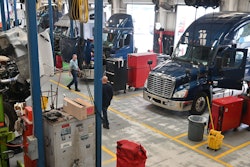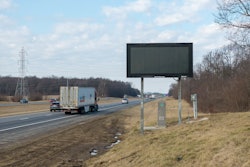Trucking news and briefs for Friday, March 8, 2024:
New ‘UltraLow’ configs part of Peterbilt's car-haul mix
 Peterbilt has introduced new UltraLow car-haul configurations for the 567 and 589 models.Peterbilt
Peterbilt has introduced new UltraLow car-haul configurations for the 567 and 589 models.Peterbilt
Peterbilt announced introduction of two new vehicle configurations for the car-haul market -- the Model 567 UltraLow Roof Day Cab and the Model 589 UltraLow Roof 58-inch Sleeper.
These new configurations were developed in collaboration with leading car carriers and set new benchmarks in low-profile design, lightweight solutions, safety features, visibility and driver comfort, Peterbilt said.
“The introduction of these two new configurations for car carrier applications is another example of how Peterbilt designs and manufactures products that provide individualized solutions for the unique needs of our customers,” said Scott Newhouse, Peterbilt chief engineer.
The Model 567 day cab version is a lightweight option for car haulers. Designed with a factory roof height of 95 inches, this model eliminates the need for aftermarket modifications.
[Related: Operational considerations when learning the car-hauling ropes]
The new 589 sleeper variety offers style and comfort to customers, Peterbilt said. With a 100-inch roof height, it achieves a low profile while providing a spacious 2.1m cab. This exclusive model is tailored to meet unique long-haul demands.
The Paccar MX-11 and MX-13 engines, coupled with the Paccar TX-12 transmission, provide advanced power and performance for heavy car carrier applications, the company added.
Customers can place orders for the Model 567 and Model 589 car carrier configurations through any of Peterbilt’s 425-plus dealer locations in North America.
[Related: Test drive: The Model 589, Peterbilt's successor to the 389]
OOIDA requests wants more comment time from FMCSA on leasing, sexual assault/harassment
The comment periods for two information requests from the Federal Motor Carrier Safety Administration are winding down.
One comment period, which is set to close Monday, March 11, involves a planned FMCSA study to understand and quantify the prevalence and severity of sexual assault and sexual harassment (SASH) experienced across trucking and bus industries, particularly among drivers. FMCSA asked for information on how best to design and conduct the study to identify, categorize and assess context and trends. Comments can be filed here.
The Owner-Operator Independent Drivers Association, in a joint letter with Women in Trucking, asked for an extension of the comment period for an additional 30 days in order to provide “more comprehensive feedback from drivers, industry stakeholders, and other organizations who may have recommendations and insights about how this SASH study can best be organized and conducted.”
Extending the comment period, the groups said, might also give the agency an opportunity to hear from drivers during the Mid-America Trucking Show, March 21-23, in Louisville, Kentucky.
As of March 8, only 10 comments had been filed on the docket.
OOIDA also requested more time for stakeholders to comment on FMCSA’s request for driver input about truck leasing arrangements they have personally experienced or of which they have knowledge. The comment period is set to close Monday, March 18. Comments can be filed here.
OOIDA asked for an additional 30 days to comment “in order to provide [the Truck Leasing Task Force] as much as data possible. This will give drivers and other members of the public sufficient time to collect and submit leasing information.”
In the days following OOIDA’s request, FMCSA announced the TLTF will host a public session at the Mid-America Trucking Show on Thursday, March 21, with time allotted for MATS attendees to speak to the task force.
As of March 8, just 12 comments have been posted to the docket.
[Related: Truck Leasing Task Force hosting public session at MATS]
FMCSA considering study of safety impacts of ‘human-ADS team driving’
The Federal Motor Carrier Safety Administration is planning to seek approval from the Office of Management and Budget for a study that looks at the safety impacts of team driving applications between humans and automated driving system-equipped trucks.
The agency is specifically looking at Level 4 autonomous driving technologies, which are capable of all functions and controls necessary for driving without human monitoring in limited conditions, and the human driver will not be asked to take over control of the vehicle.
FMCSA said there are currently four use cases where a human may team with an ADS-equipped truck:
- In-vehicle driver teams with an ADS truck
- In-vehicle driver teams with a following ADS-equipped truck
- In-vehicle driver teams with a remote assistant to monitor and control an ADS truck
- Remote driver teaming with an ADS truck
FMCSA noted that it’s currently “unclear how each human-ADS teaming use case will affect safety, productivity, and efficiency. Each teaming combination may positively or negatively affect a driver’s cognitive workload, level of fatigue, alertness, or distraction compared to the case of a traditional driver in a truck without ADS.”
The purpose of the study, FMCSA added, is to quantify safety implications of the four teaming use cases. The study would include data collection from a series of questionnaires and a driving simulator focused experiment. The agency anticipates 80 drivers will participate in the simulator study, which will consist of one study session lasting up to 17 hours. Questionnaire data will be collected prior to the simulator study, during the simulator study, and after the simulator study.
Comments and recommendations for the proposed information collection should be sent within 30 days of publication of the notice to www.reginfo.gov/public/do/PRAMain. The information collection can be found by clicking "Currently under Review - Open for Public Comments."
[Related: California reignites driverless-truck ban]










